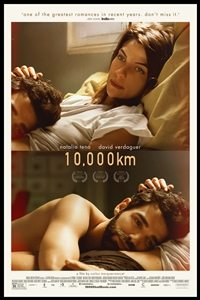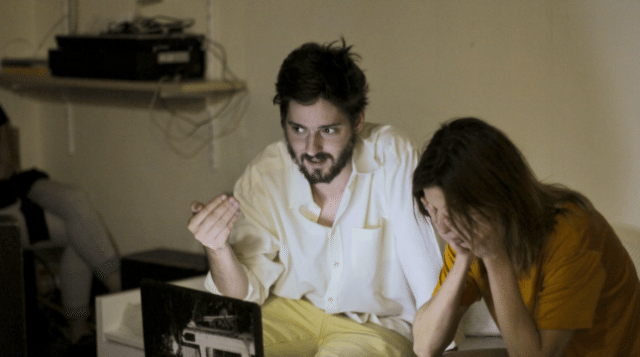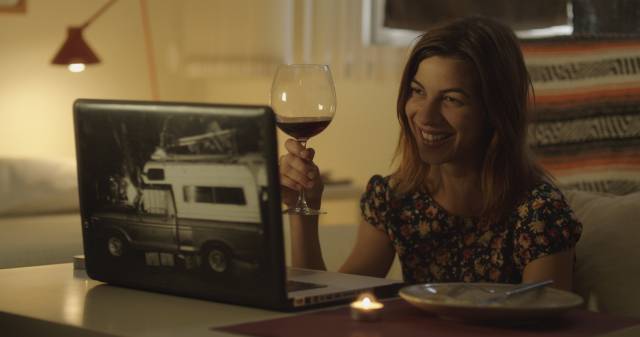

Carlos Marques-Marcet’s 10.000 Km. centers on the relationship between Sergi (David Verdaguer) and Alex (Natalia Tena), a couple living in Barcelona who have been together for seven years and are discussing the possibility of having a child, when Alex receives news that she’s been given a grant to do a photography project in Los Angeles. Upon his insistence she takes advantage of the opportunity and moves to California, we see their relationship turn into a series of digital and virtual interactions, as they communicate via Facebook, email, video chat and texts.
Without any bells and whistles, Marques-Marcet’s lovely film shows the pros and cons of long distance relationships, while making us wonder if it’s possible to retain our humanity when we’re left to interact with nothing screens and buttons. 10.000 Km. is a thoughtful essay on existence, without becoming too nihilistic it poses questions about the importance of corporeality and even challenges our notions of love as a truly abstract concept. Verdaguer and Tena turn in devastatingly beautiful performances as the star crossed lovers.
As the film prepares for a Stateside release we had the opportunity to talk with Marques-Marcet and Tena, both of whom commented on how is it to live in a “modern world”, their favorite screen romances and how a rehearsal process helped them make 10.000 Km.
Carlos, this is is your first feature length, is it a coincidence that it’s such a small scale film, with very few locations, or did you at some point want to do a bigger film?
Carlos: I never thought of what I wanted to be my first film, I don’t have a vision of what my career will be like yet, so I’d rather not think about those things for now. All I knew is I wanted to tell this story because it had been following me for quite some time, in fact originally the film had more locations and more characters. During the pre-production the screenplay went through some changes, which led us to only having Natalia and David’s characters, but it was always more of an aesthetic rather than financial decision.
 Usually phones and computers look rather ugly onscreen, however in your film they are so beautifully shot that at times they recall vintage sci-fi. Can you talk about how you came up with the film’s look?
Usually phones and computers look rather ugly onscreen, however in your film they are so beautifully shot that at times they recall vintage sci-fi. Can you talk about how you came up with the film’s look?
Carlos: I knew that the audience would connect to the film through the actors but I also wanted to make a film that would be potent from a formal point of view. I wanted to make a film in which every frame would be charged, not just symbolically but also emotionally. I worked very close with my cinematographer [Dagmar Weaver-Madsen] about how to shoot screens within screens within screens, since I also edited the film, I knew very well how I wanted the final result to look like.
Can you talk about the two weeks of rehearsal you had before the shoot? And Natalia, I’m curious, what things did you discover about your character during this time?
Natalia: They were two weeks of improvisation during which we knew it was important to figure out Alex and Sergi’s history as a couple, how they met, the first time they had a “sexy” moment, the first time they talked about having children...during the rehearsal process I was thinking a lot about one of my cousins, a very observant woman, she’s very social, she’s not shy, but there’s something very patient about her, so I discovered my character would be very much like my cousin.
I loved that scene where Alex is taking pictures of cameras…
Natalia: (Laughs out loud) Look, that was the scene I was most terrified of doing…
Why?
Natalia: Because I had no idea what the hell I was doing! I didn’t understand what any of these tools were, so I thought it wouldn’t look real. I had no idea how the cameras work.
Carlos: We trained her for a week, the photographer was there to help her and he was there again when we shot the scene, it was very important for us to be as specific as possible since we were working with camera plates, and most people nowadays use digital cameras. I liked the idea to have her take pictures of these vintage cameras using a modern camera.
This scene also becomes very “meta” and makes viewers aware of the medium. For instance I AirPlayed the film from my phone to my television…
(They both laugh)
...and I couldn’t help but think how unlike many filmmakers obsessed with hyper-realism, you take us out of the film to make us aware of the fact we’re surrounded by screens and buttons all over.
Carlos: I was interested in having the actors give naturalistic performances which I shot through a meta-cinematographic technique, I had a very clear idea of a labyrinth and how there’s screens within screens. Our idea was to convey a game in which the camera disrupted the naturalism. What was real? Reality is constructed.

Natalia, you’re no stranger to working with CGI elements, how were your experiences in Game of Thrones and the Harry Potter films similar to acting opposite David Verdaguer in a computer screen?
Natalia: This is not the first independent film I’ve made so in fact to me working in smaller productions feels more real. Acting opposite the computer screens was easier than I thought it would, actually the most difficult thing for me was figuring out how to use the computer and video chat. The acting part was easy because David made me laugh a lot.
Considering how nowadays we seem to be “directing” ourselves all the time and building sets whenever we do video chats, do you think people are always giving performances when they communicate?
Carlos: I thought about that a lot, especially when I was writing the screenplay. We use video chats and Facetime and we become directors, we choose the frame, our background, it makes us feel very self conscious.
Natalia: But sometimes if you do it a lot you end up not thinking too much about it. If I’m on the phone I don’t think about it, but I guess it also depends on who you’re talking to. I guess it’s the same as talking with someone face to face.
Carlos: I think you become more conscious of it because you have to use a tool to communicate.
Natalia: Right, but if I’m going out on a date in real life, I would probably act the same way over the phone with that person.
The movie made me cry quite a bit, because it reminded me of some of my all time favorites like Brief Encounter, Casablance and Weekend. I have a soft spot for doomed romances, perhaps because I’m a masochist at heart…
(They both laugh)
...what are some of your favorite sad screen romances?
Carlos: We talked a lot about Stanley Donen’s Two for the Road which is one of my favorites, even if evidently it’s much more optimistic, also Maurice Pialat’s We Won’t Grow Old Together, Ingmar Bergman’s Scenes from a Marriage, Brief Encounter too...there’s a lot actually.
Natalia: I love Life is Beautiful, it makes me so happy. Recently I watched The English Patient for the second time and I realized how dark it is. It’s a great movie.

I guess we’re all a bit masochistic then, Natalia did you imagine a future for your character after the film ends?
Natalia: Once I finish a film I set it aside, I know that at some point you have to watch it and that’s slightly scary, but having to watch what you did and knowing you can’t change anything about it can be very hard.
Carlos, in a way the film can inspire young Spanish filmmakers and show them that it’s possible to make cinema without huge budgets. I found this to be quite a powerful political statement considering the economic situation in Spain and Europe. Can you comment on this?
Carlos: I don’t know about that, I don’t think of myself as a master, quite the contrary actually I think I’m learning, so I can’t teach anyone lessons about anything. I think you make the film you want to make or the film you can’t help but making. I think about the elements I need to tell my stories, if there’s anything political about the film it’s in the plot itself where we see the characters having to take decisions in face of the economy. Things like having to leave your country to find work elsewhere and leaving behind those you love.
The film deals a lot with cultural shock, I laugh whenever I remember Alex realizing Americans keep rabbits as pets and don’t eat them. Having worked in various countries what would you say has been your most memorable experience of cultural shock?
Natalia: I haven’t had much of that because I’ve mostly worked in Europe, I’ve never worked in America.
Carlos: In Spain there’s something I love called “bucata time”, where at mid morning everyone stops what they’re doing for fifteen minutes to make themselves a snack, then you take an hour for lunch. Americans don’t have that, what surprises me about the States is the size of the portions. Everything is so big!
Natalia: Also when I’ve worked with Americans they seem to have set hours for their meals, which is something that doesn’t always happen in Spain or Italy where you may end up working two extra hours while you’re starving. Come on!
Carlos: Natalia is very British too, she likes things done the British way!
10.000 Km. will be released in theaters and VOD on July 10, 2015.